Destination: Himalaya, India
Duration: 15 Day(s)
Group Size: 9
Pillion Friendly: Yes it is, but it's pretty bumpy in places
Terrain: All tar – some potholes and road damage
Support: Tour leader / First-aider | Support vehicle
Distance: Approx 1500
All the riding on this tour takes place in the North Indian state of Himachal Pradesh (HP), which, covering 21,500 square-miles, consists almost entirely of high mountains and their foothills. HP is one of India’s wealthiest states, per capita, gleaning its income from agriculture, tourism and hydroelectric power. Local handicrafts also add to the economy, with woollen shawls and other textiles being the most commonly seen.astoundingly scenic, we can’t recommend this tour highly enough for those who want a tasty blend of twisty roads and cultural and culinary interest.
The 'START DATE' (Day 1) date is the date of arrival at your destination airport. The 'END DATE' is the date on which you fly home.
Please make sure that on booking you select a tour date and bike.

Fly to Delhi airport, to arrive the following day.
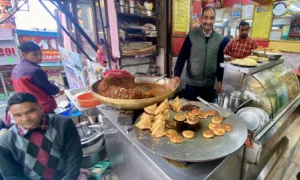
Switch to the domestic terminal for the short flight north to Chandigarh airport where you will be met by your Blazing crew. Dinner and a briefing await at the hotel.
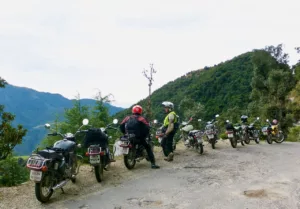
Come morning we will hop aboard our Enfield Himalayans and take them at their names, heading up into the mountains to Shimla, the bustling summer capital of the Indian Raj administration. Gods-willing, we will arrive in time for lunch and an afternoon's colonial exploration.
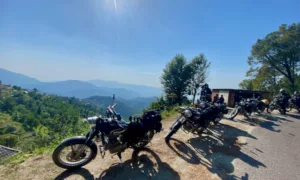
A full day's ride carries us through the hills of rural Himachal Pradesh and views are stunning as we wind into the mountains. We pass through the sacred hot-spring town of Tattapani and travel on into the back of beyond. There is barely a straight piece of road and the riding is sublime. Our destination, Mandi (870m), is a thriving market town on the banks of the holy Beas River. Our accommodation, a characterful heritage hotel, will be found in what was once the local ruler's palace.
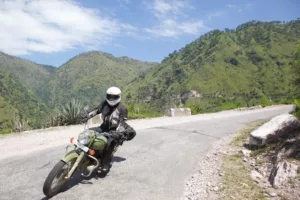
From Mandi we head east – and up – along a sweeping highway. Following this blissful road, the huge mountains soon come into view, looming ahead of us. Turning off the highway we climb steeply, passing through Dharamsala and up to our hotel in McLoed Ganj, above the busy town.
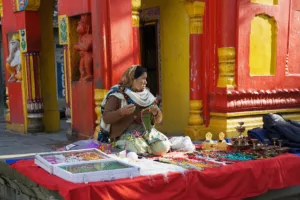
McLeod Ganj is home to the exiled Dalai Lama and a huge Tibetan community, including the Tibetan government-in-exile. The town is cosmopolitan, colourful, packed with shops and eateries and is a wonderful opportunity for photographers. There are also colonial relics to explore, including the St John in the Wilderness Church. If you prefer something more strenuous, local treks of various durations and severity can be arranged with local guides.
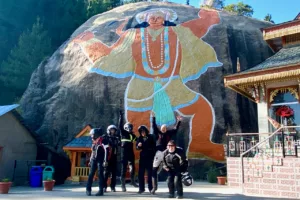
Today we hit the road, leaving McLoed Ganj and heading over remote hills to Chamba. This is an incredible road and an incredible ride as the tarmac ribbons its way steeply upward, with huge drop-offs and vast panoramic views. Although the distance to be covered is relatively small, the twistiness of the road means this is a whole day’s ride, with time to take a few cups of chai and stops to admire the scenery.
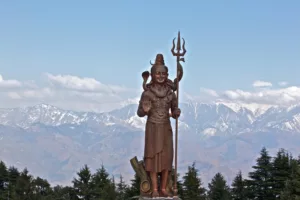
A short morning stroll to the 1000-year-old Laxmi Narayan Temple can be taken in the morning, before we head up the hills for lunch on the mountain overlooking town. Making for Khajjiar, the roads are all swervery and scenery. Our hotel stay has views over a small lake in the forested hills, where we can relax with a drink in hand.
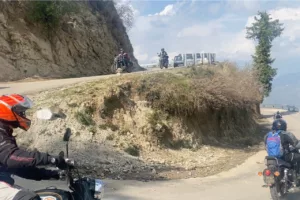
From Khajjiar we head back into the mountains to start a full day's ride. Having passed though the colonial hill station at Dalhousie, we go down to the Kangra Valley floor at just 615m above sea level. We will pass through Kangra Gorge, where we have views across to Kangra Fort and continue along the highway to Dharamsala, where we will spend the night in the hills, with our hotel overlooking the valley below..
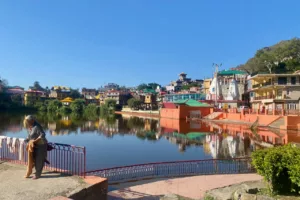
We continue along the highway until we hit the steep hill road up to Rewalsar. This small mountain town is sacred to Buddhists, Hindus and Sikhs and colourful tribespeople can be seen circling the lake, chanting prayers. Overlooking the lake is a huge statue of Buddha, monasteries and temples. It is a fabulous and fascinating spot and we will have the afternoon to enjoy it.
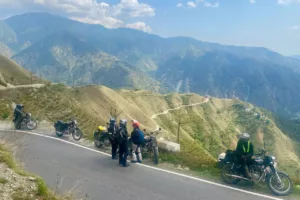
From Rewalsar we descend to the town of Mandi, before heading up again on another spectacular ride. A small winding road takes us over a forested pass with yet more remarkable views. We then follow the road down into the Kullu Valley, where we meet the main highway and slowly climb to the Solang Valley, above the busy tourist town of Manali where we will stay in the shadow of high mountains.
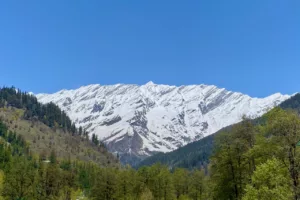
Manali, gateway to the high Himalaya, is a thriving tourist hub. Good restaurants abound, whether you're looking for Indian, Tibetan, or western fare. There are several interesting temples in the area, hot springs and the option of trekking, or taking part in other adventure activities. Our accommodation has views straight to the snowy heights, with in-house trekking guides and paragliding.
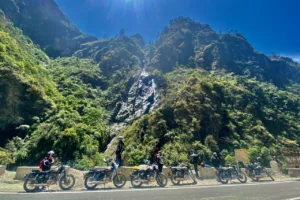
An early start for a long and very curvaceous ride. Leaving Manali, we will follow the the Beas River, through busy villages, skirting the district capital, Kullu. Soon the route breaks into a huge canyon with the road carved into the cliff-face, with small shrines and waterfalls. Around 80km into the ride we hit the rural roads again, climbing beautiful forested passes at around 2400m metres elevation. We end the day at a charming hill-top hotel, set in pine forest. Watch out for the flying squirrels.
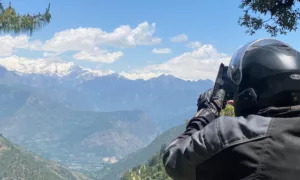
More forest riding ensues as we head down to the Sutlej Valley. As we meet the river, we turn west, riding through small villages on twisting roads through the Himalayan foothills. The ride ends in the Chail area, where we spend the night in the characterful grounds of a Royal Palace.
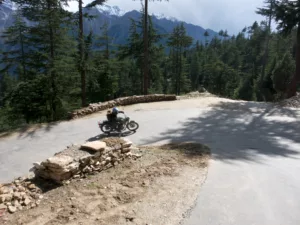
From the pine forest palace we will start the day riding through a nature reserve before meeting the main highway and heading down to our start point. Here we will have a celebratory dinner to mark the end of a beautiful ride.
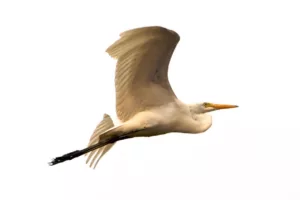
You will be flying back from Chandigarh to Delhi and whatever time you choose to fly, we will send you off to the airport and wave bye bye.
The tours can be booked online, by email, or over the phone on: +44 (0) 7494 050404. To secure a place you will be asked to put down a deposit of £500 and payment can be made by card, cheque, or bank transfer.
Yes. We enjoy hosting riders from all countries.
Flights are not included in the price of your tour, but we can provide details of where to book an appropriate flight.
For many nationalities, a tourist visa is issued free of charge at your port of entry. It is, however, your responsibility to check current regulations.
You will need a valid certificate of travel insurance.
We own and manage our own fleet of bikes.
If you damage the bike, you will be charged for the damage up to the amount of your excess. On all our bikes, the excess is £1000, so in the event of a mishap you will not be charged more than this amount. If the damage is less than this amount, then you will only be charged for that damage.
If you have damaged the bike near to this total, we may ask you to place a further deposit before continuing.
Yes, you need travel insurance to cover you for the period of the tour. This insurance must cover you to ride the bike you have booked.
We would advise that you change some money on arrival at the airport. ATMs are widespread and an efficient way to get hold of cash. Credit and debit cards are accepted nearly everywhere.
About 300-£400 should cover food, drink, petrol and sundries.
Yes, unless you pay a supplement. Even then, single rooms may not be available at some stops as the hotels we use are popular, or in some cases small, and we have to book our accommodation some time in advance.
It varies widely (and tour-to-tour), but is always clean and the best we can find in the area for a reasonable price in a suitable setting. We are always in clean, comfortable hotels and guesthouses.
Yes, but you may need a travel plug adaptor.
We would recommend only booking a tour with us if you have a licence to ride your tour bike (compulsory) and have at least a year’s recent riding experience. The main criterion, however, is confidence.
Riding anywhere carries with it a degree of risk, as does riding in South Africa. However, with light traffic and good roads, we would suggest that riding in South Africa is no more dangerous than a tour in Europe. For more information on the riding side of things see ‘Riding’ in the ‘About South Africa’ section of this site. If any rider joining us rides in a manner we suspect will endanger themselves, or others, or indeed displays antisocial behaviour, they will receive one warning. If they continue to display a threat to the safety or enjoyment of others on the tour, they will be excluded from the remainder (with no refund given, see terms and conditions).
We will be riding ‘progressively’, at or around the speed limit and according to conditions. Most South African roads outside built-up areas have a 75mph speed limit – fast enough on the twisties. There are fixed cameras and mobile speed traps in towns…
No, you can’t ride independently of the tour group, sorry.
No fitter than you would have to be to tour Europe.
You are limited by most airlines, so check with the carrier. However, we suggest you pack as lightly and in as compact a form as possible. Bring only soft luggage to be carried on a support truck.
Keep it minimal. One set of riding kit for the tour and a few sets of clothes for the evening. There are usually laundry facilities at two-night stops – check your chosen itinerary. Leave some space for shopping you do in SA.
While South Africa has had some pretty bad press in recent years for violent crime, very little of this nature happens in the tourist areas through which we will be travelling. And, as ever, the media tends to sensationalise the bad and ignore the good. Being guided through the ‘right’ areas in a group greatly mitigates the chances of encountering unpleasantness. Petty crime – pick-pocketing and theft – happens, as it does in virtually all tourist destinations with a wide gulf between rich and poor. A few simple precautions, like keeping your wallet/docs in an inside pocket and leaving nothing unattended on the bike, should mean a trouble-free tour. You will be briefed on sensible measures prior to setting off.
If you’re wet, yes. They are provided throughout the tour.
Only some meals (check your tour for details). We prefer that where there are choices you make your own on what and where we eat. You will find South African food of a very high standard and good value.
It seems not, as we can no longer offer this experience…
They are, but not every night. Check the itinerary of your tour – you will be able to get clothes cleaned at two-night stops, so consider this when packing.
Yes. If your riding kit isn’t waterproof, then bring some light waterproofs.
Maybe, maybe not, but if you take part in a safari at Kruger, St Lucia, or Addo Elephant Reserve you will certainly see some interesting wildlife and landscapes.
Not really. There may be a few around, but you won’t be plagued. Bring some repellent. South Africa is pretty much malaria-free, but for advice on anti-malarials, please consult your doctor (take the itinerary with you).
You can’t paddle a wildebeest.
Depends on whether there are any great whites around. We would advise you to ask locally – and then go and get a beer instead.
Consult your GP/travel clinic for immunisation and malaria advice. Bring enough of any prescribed medication you take regularly. A basic first aid kit is useful (plasters, antiseptic cream, bite/sting relief, plus insect repellent).
Gel or air pads add comfort on long days in the saddle, but are not necessary.
Yes, but you’re going to South Africa.
31 Rock Road
Oundle,
PE8 4LN
United Kingdom